A Bold Vision for Downtown Raleigh’s Future: Announcing First Recommendations from Downtown Raleigh Economic Development Strategy
Downtown Raleigh Alliance (DRA) and the City of Raleigh are excited to announce the first set of recommendations developed by the consultant team led by Interface Studio as part of the Downtown Raleigh Economic Development Strategy process.
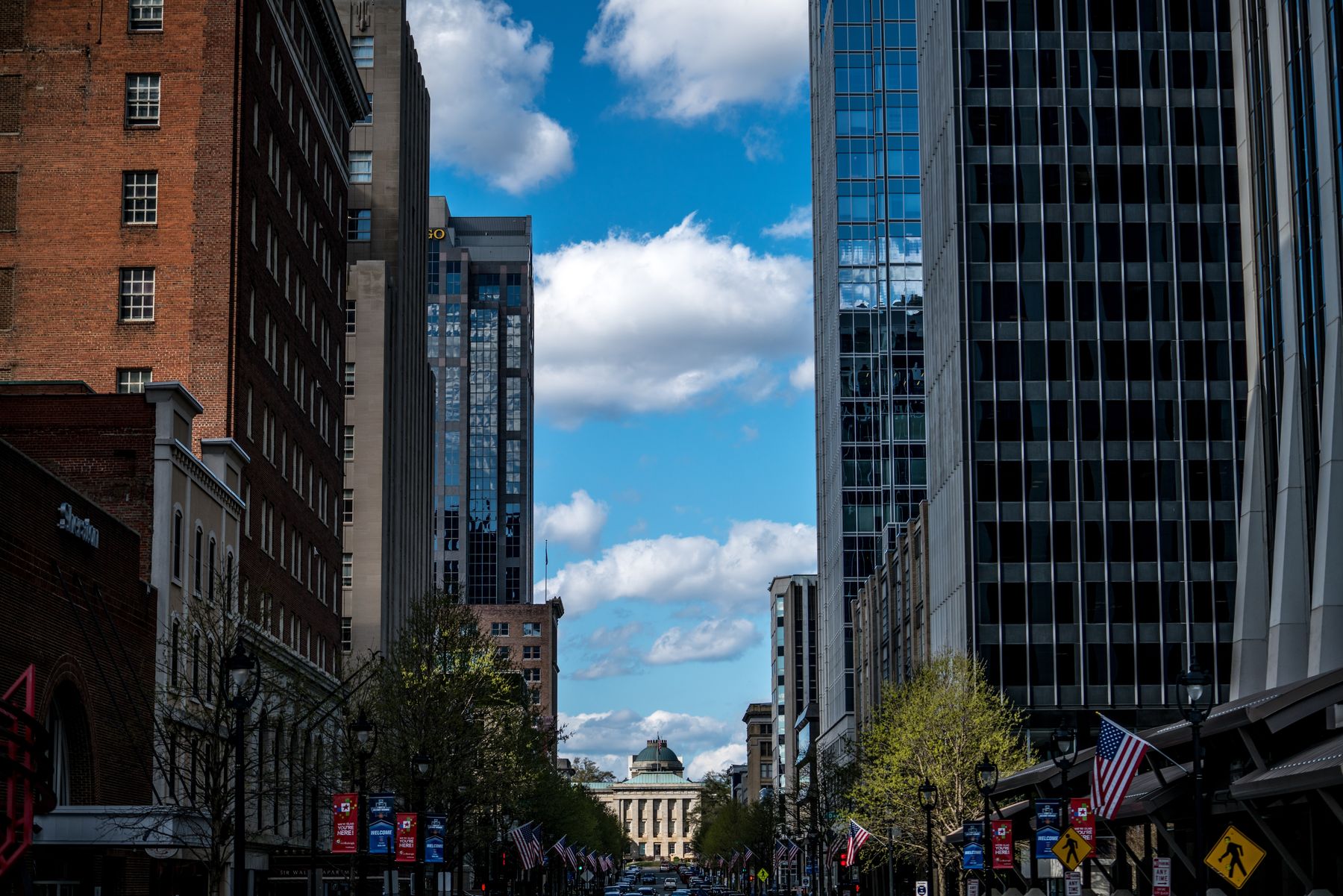
The first ten recommendations of the Economic Development Strategy focus on improvements to the Fayetteville Street corridor. As the heart of downtown and center of the state, a thriving Fayetteville Street district will catalyze downtown’s growth as the area continues to evolve in response to the ongoing effects of the pandemic.
See a breakdown of the ten big recommendations for activating Fayetteville Street and read the full report below. For more information on the overall Economic Development Strategy project please view the project webpage here.
Have feedback on the draft recommendations? Provide your thoughts to the project team via the form linked below.
The Economic Development Strategy process is at the halfway point, with more work to come on refining the recommendations for Fayetteville Street and creating a more comprehensive, downtown-wide strategy document addressing:
- Creating a retail strategy for downtown
- Examination and positioning of the downtown office market
- Improving opportunities for Women- and Minority-owned businesses
- Developing the next big ideas for Downtown Raleigh
Stay tuned for more public engagement opportunities for that work over the next few months and sign up for updates as the process unfolds.
Community Engagement:
For this chapter of the study, Interface Studio worked with DRA to conduct extensive community engagement and research to inform project outcomes and ensure this process best reflects shared goals and opportunities.
In addition to direct interviews with stakeholders in Downtown Raleigh, the consultant team and DRA gathered feedback through focus groups, community meetings, and pop-ups. In total, more than 65 interviews and focus group sessions were held, with a diverse array of community members and backgrounds invited to participate in the process. This critical feedback helped the team create durable recommendations that create a thriving, growing Downtown Raleigh built for everyone.
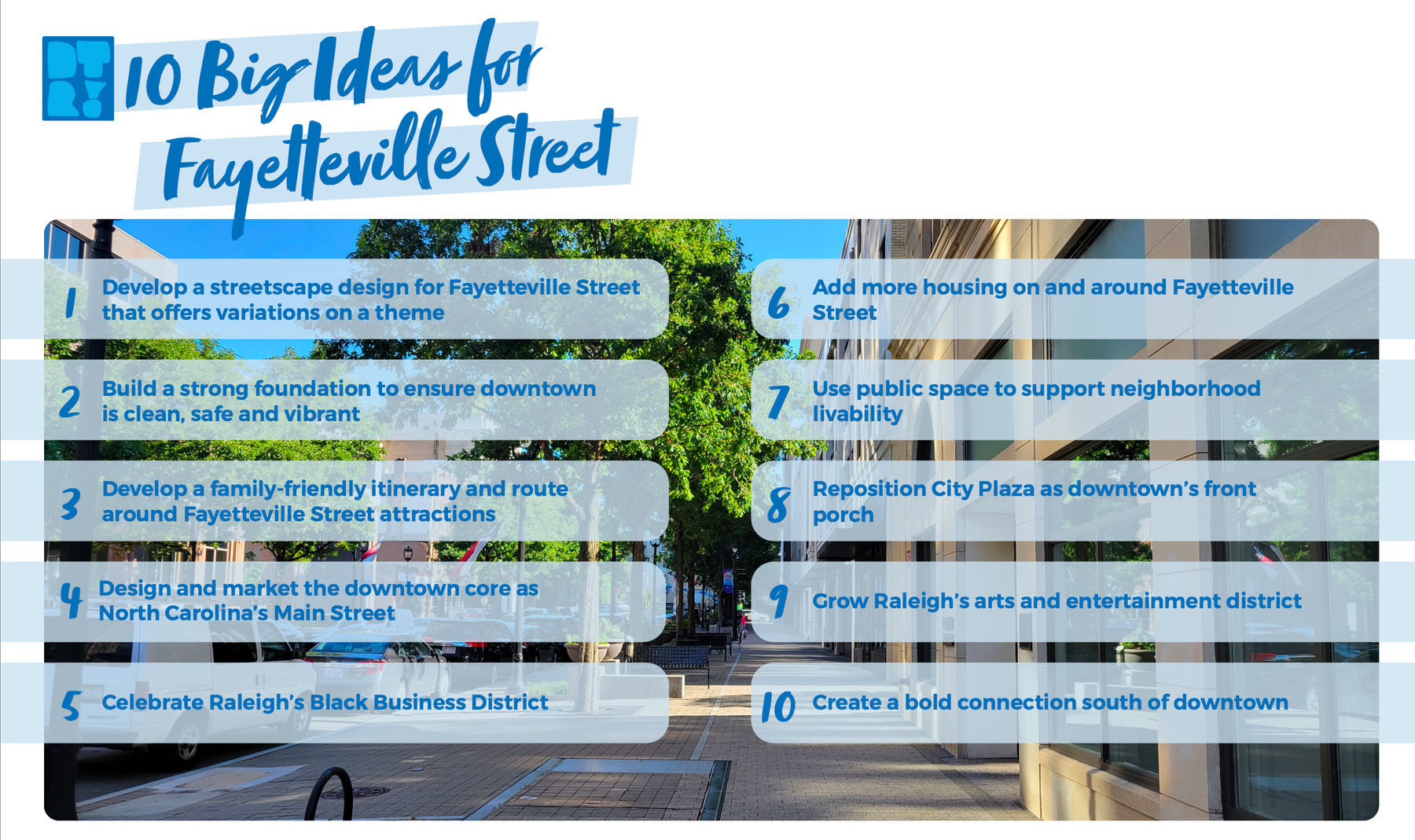
Recommendations:
The “Activating Fayetteville Street” report features ten recommendations that outline bold ideas and opportunities for reinvigorating the Fayetteville Street area of Downtown Raleigh and creating more dynamic connections to surrounding neighborhoods:
Idea #1 - Develop a streetscape design for Fayetteville Street that offers variations on a theme.
Fayetteville Street should be the green heart of Downtown Raleigh and the front door to North Carolina; a lively place that attracts visitors and connects the surrounding neighborhoods. Suggested improvements focus on updating seating, creating flexible space for activations and recreation, and delineating clear zones for business use.
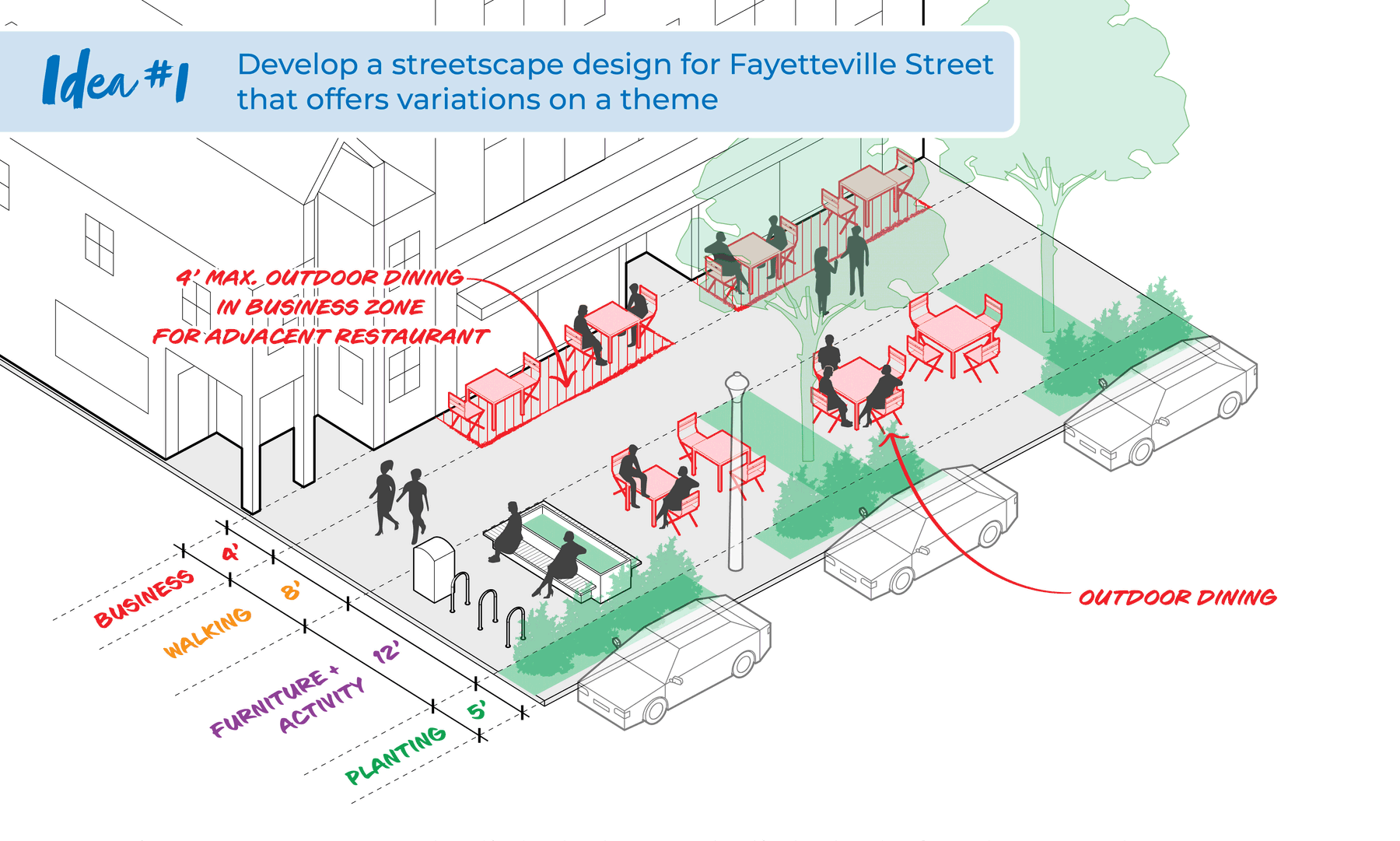
Idea #2 - Build a strong foundation to ensure downtown is clean, safe and vibrant
Safety is the bedrock for a vibrant downtown and many aspects of the public
realm contribute to the perception of safety, including street maintenance,
sidewalks and landscaping. Creating a better visitor experience by focusing on safety and appearance will leave lasting impressions, generate positive word of mouth, and encourage repeat visits.
Idea #3 -Develop a family-friendly itinerary and route around Fayetteville Street attractions
Downtown Raleigh has some of the greatest attractions a downtown can offer. Today, these assets feel disconnected. If we invest in making connections to the surrounding business districts and neighborhoods while providing families with fun, safe, and educational activities to explore, they’ll spend more time making memories downtown. That’s a win for everyone.
Idea #4 -Market the downtown core as North Carolina’s Main Street
Clustering retail and restaurants around a “Best in North Carolina” theme and
engaging public space design will bring more people downtown. Strategically reinvesting and supporting tenants present and future through a unique district identity will make downtown more attractive to residents and visitors.
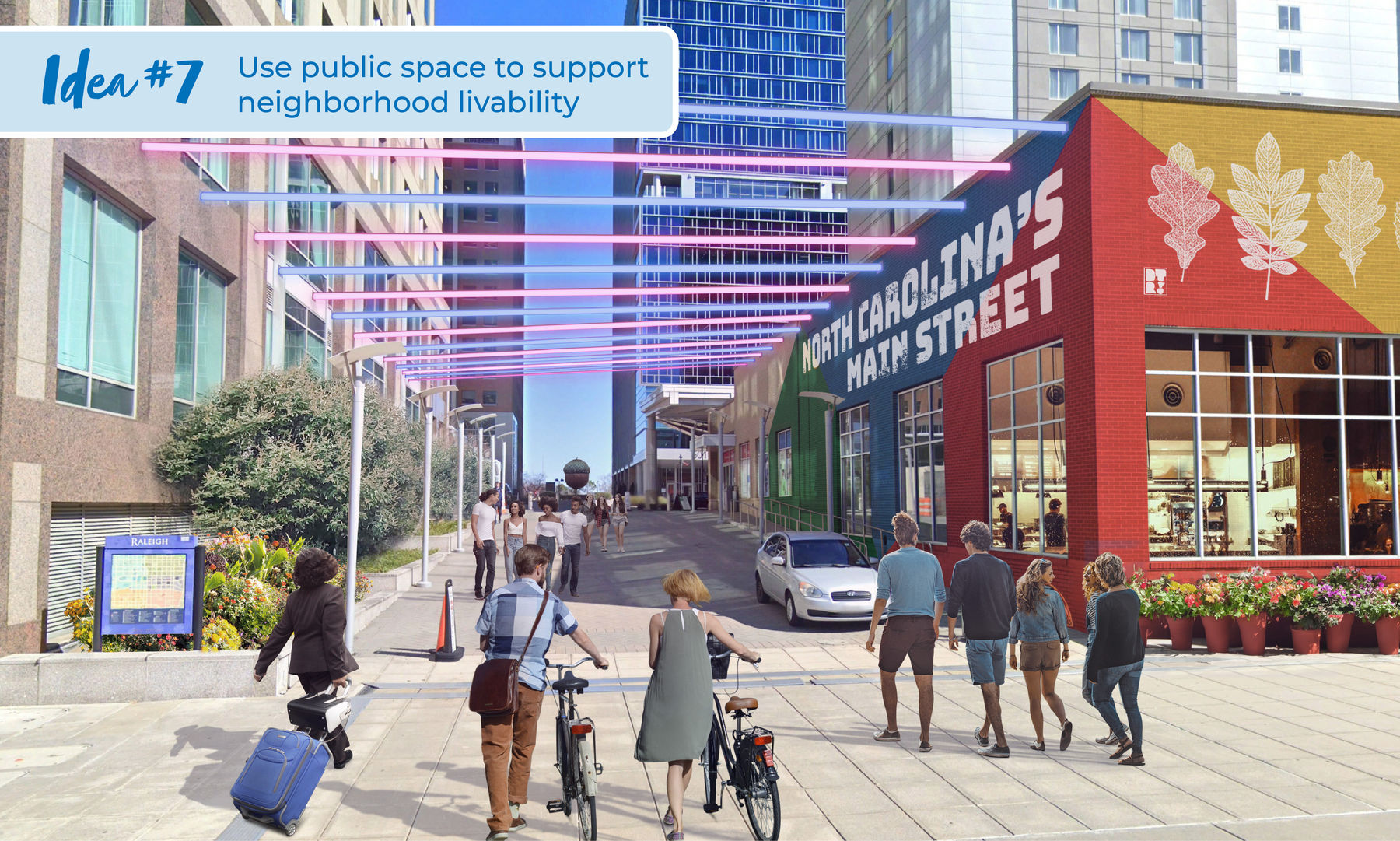
Idea #5 -Celebrate Raleigh’s Black Business District
The Black Business District can be elevated by more fully incorporating the district into Downtown Raleigh. Creating more visibility for Black-owned businesses, storytelling through public art, and placemaking events will honor the legacy and history of the area and create conditions for these businesses to thrive.
Idea #6 -Add more housing on and around Fayetteville Street
Of the more than 5,300 residential units built or under construction since 2020, most are not on or adjacent to Fayetteville Street. Strategic redevelopment on Fayetteville Street, encouraging mixed use development and recruiting coffee shops and businesses that complement housing density, and addressing parking needs can bring a healthy mix of residents, workers, and visitors to support area businesses.
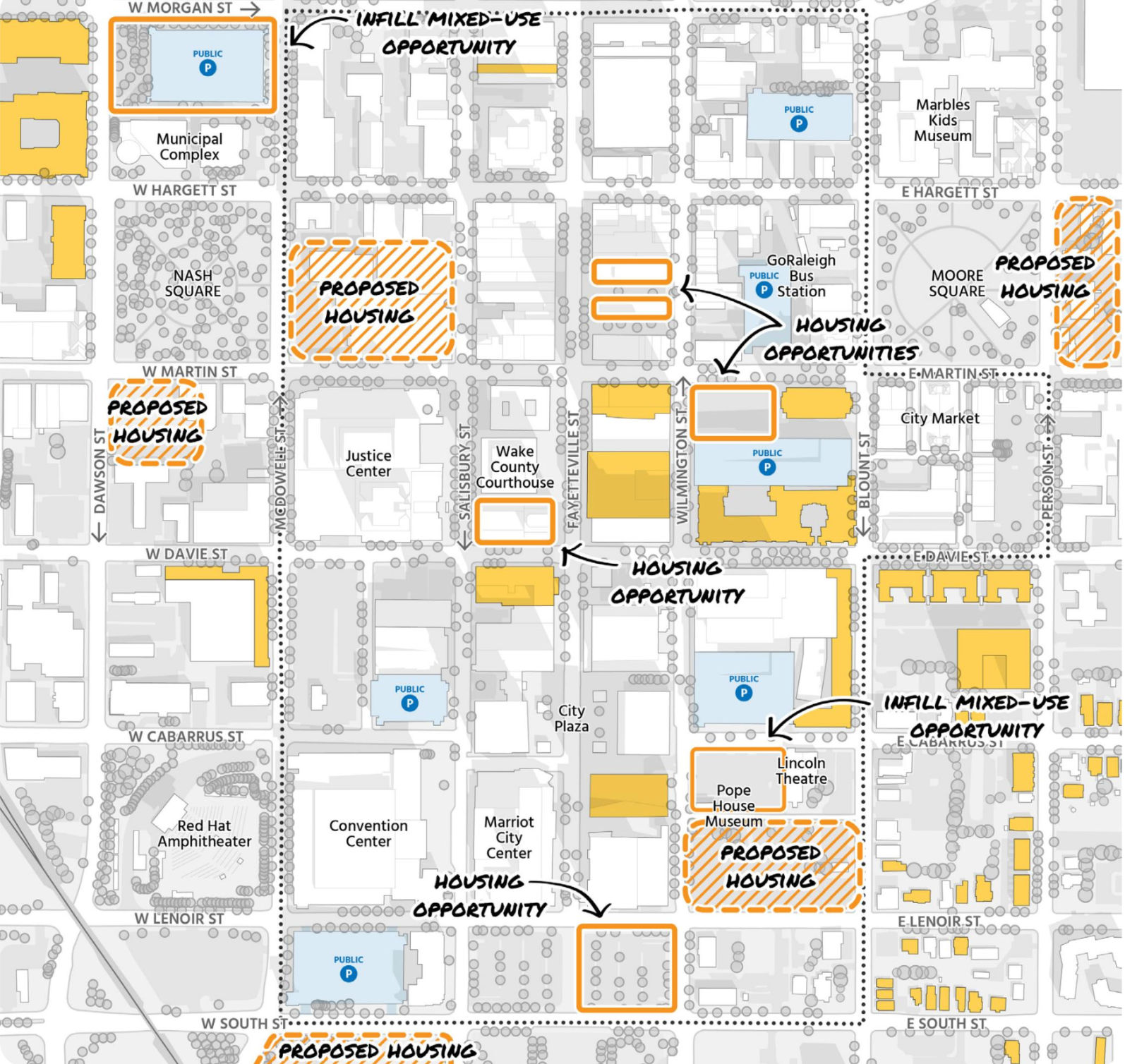
Idea #7 - Use public space to support neighborhood livability
Attractive, vibrant public spaces that serve the community needs will make Downtown great. We’re exploring ways to use lighting, art, and creative wayfinding to connect downtown to the surrounding neighborhoods. And we’re exploring ways to create flexible spaces that support large- and small-scale events for residents and businesses.
Idea #8 -Reposition City Plaza as downtown’s front porch
City Plaza can be the heart of the city - from food and drink to artisanal products to art and entertainment. City Plaza is designed as an easy-to-use outdoor venue for major festivals and concerts. The day-to-day experience, however, is much different. Strategic investments in the plaza can welcome residents and visitors and introduce them to all the city has to offer.
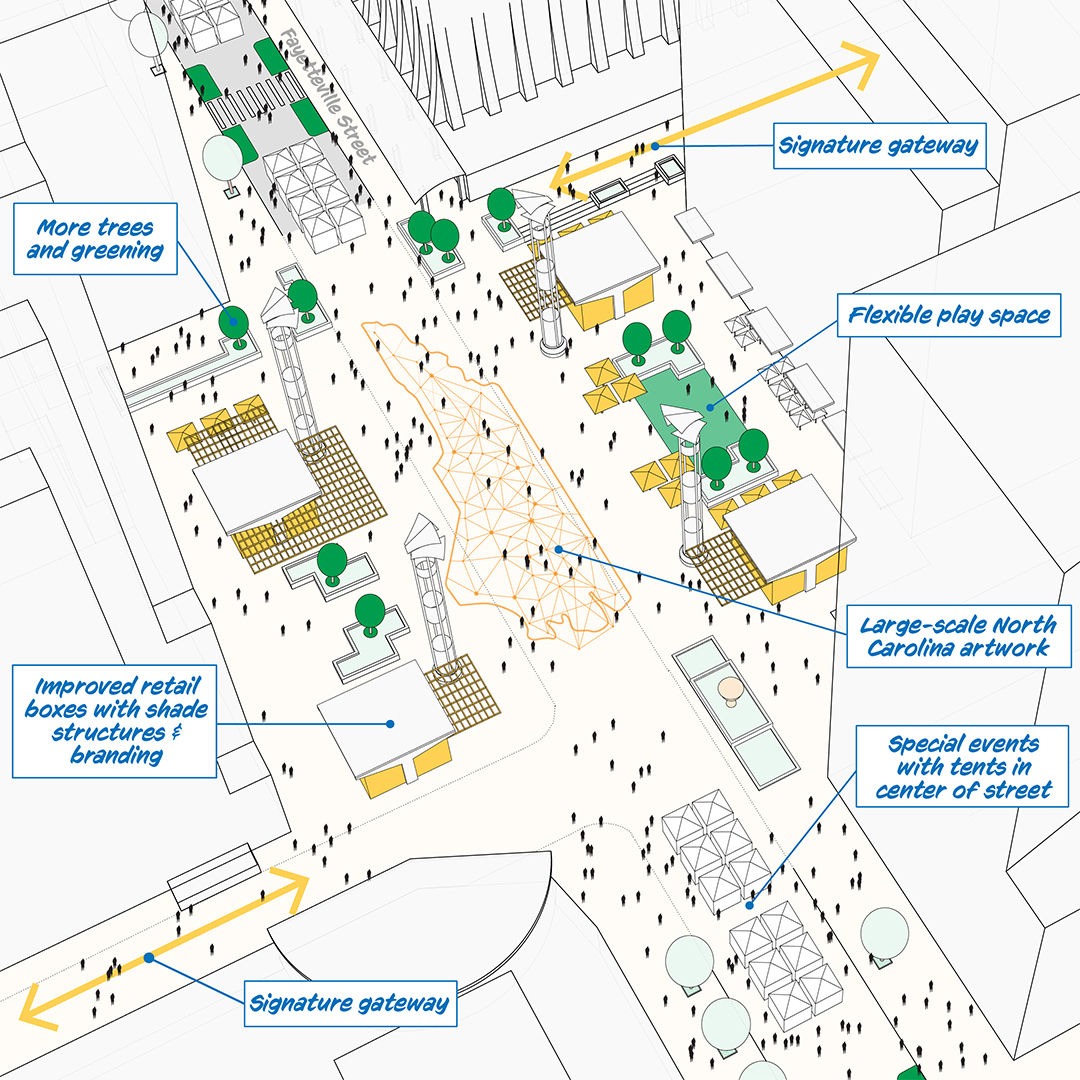
Idea #9 - Grow Raleigh’s arts and entertainment district
By leveraging larger-scale development opportunities to build custom spaces for destination entertainment and restaurant concepts, the Fayetteville Street area can contribute to the area becoming more strongly associated with arts and entertainment, and able to attract visitors as well as workers.
Idea #10 - Create a bold connection south of Downtown
A number of large investments are planned and under construction just south of the downtown core, including Dix Park, Heritage Park and several mixed use developments. It will be important not just to connect Dix Park to the downtown core but also to neighborhoods and destinations along the way.
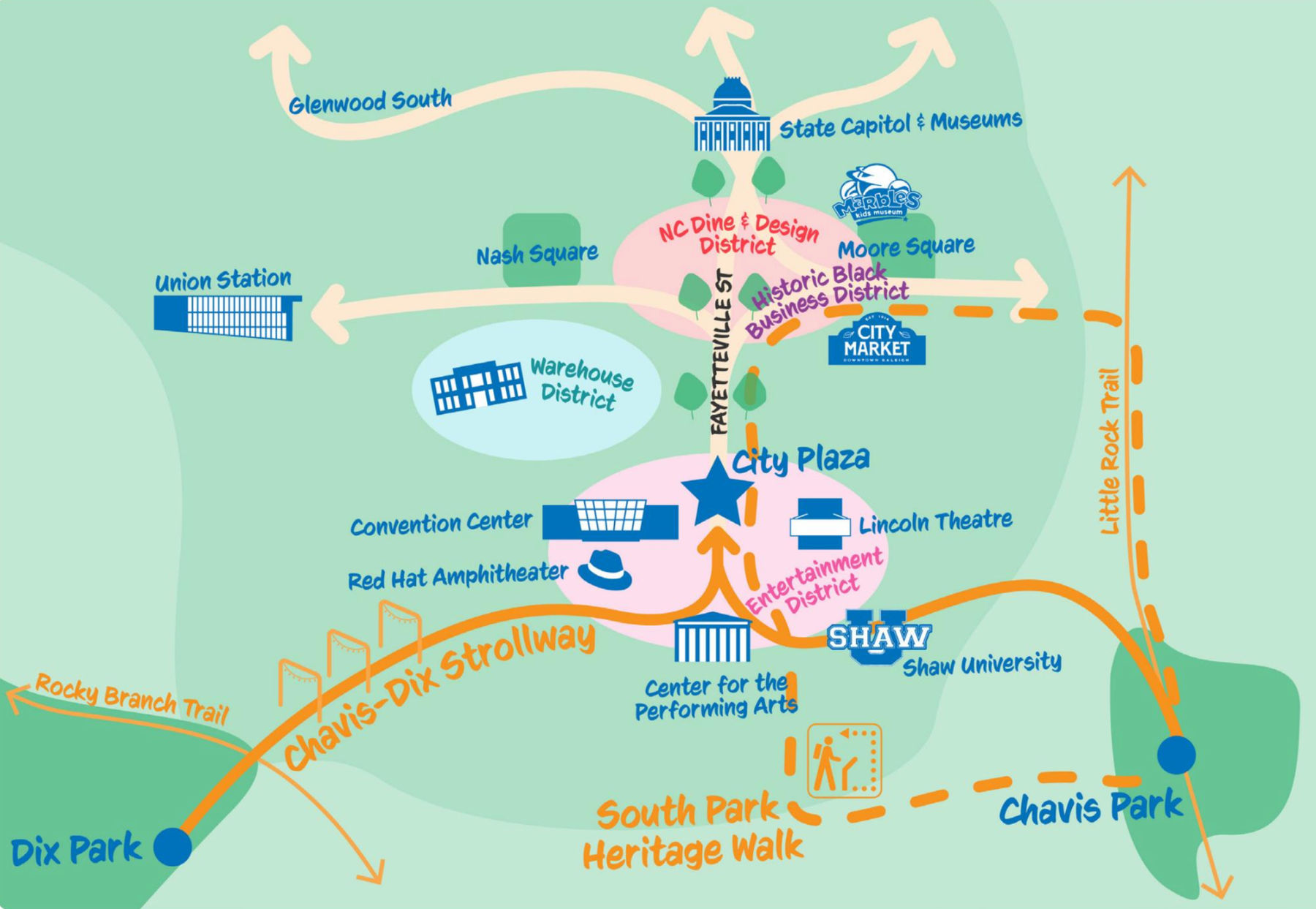
These ten ideas are grounded in establishing a culture of innovation and risk-taking that embraces a flexible approach to create vibrancy and activity on our street. They also connect the Fayetteville Street district to our broader downtown amenities, neighborhoods and cultural institutions.
Our project is currently at the halfway point of completion, with important work still underway to refine recommendations and build energy for project implementation. Throughout this spring, our staff will work with the consultant team to convene additional stakeholder groups to help formulate next steps in the Office, Retail, MWBE and Catalytic Project categories.
Full Report | Part 1: Activating Fayetteville Street
Published February 8th, 2024
Have feedback on the draft recommendations? Provide your thoughts to the project team via the form linked below.
Provide Feedback on the Report
The final product, anticipated mid-2024, will provide a comprehensive strategy and toolkit for our community to approach the cultivation of a bold and bright Downtown Raleigh that continues to thrive and grow. Our team is excited to steward this effort and we know that working together as a community, we can build a future for Downtown Raleigh that exceeds our boldest expectations.
